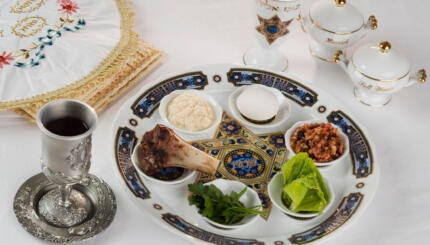Reprinted with permission from the United Synagogue of Conservative Judaism.
This idea came to us from Dr. Gil Troy, Department of History, McGill University, after hearing Rabbi Seth Mandell–whose son Koby, z”l [may his memory be for a blessing], was murdered in Israel–talking about the empty seat at his family’s Shabbat table.
At our sedarim this year, we will celebrate our joyous holiday of liberation with heavy hearts. Even as we revel in our freedom as Jews in the modern world, our brothers and sisters in Israel are in pain. In the months since the Palestinians turned away from negotiations toward violence, too many have died, too many have been injured, on both sides. And too many sedarim will have empty  chairs–missing husbands, fathers, brothers, sons; missing wives, mothers, sisters, daughters.
chairs–missing husbands, fathers, brothers, sons; missing wives, mothers, sisters, daughters.
The power of the seder–which remains one of the most popular of Jewish ceremonies–comes from its ritualization of memory. It is a most primal, most sensual, most literal, of services. The seder plate, with its representations of the mortar used in building, the haroset, of the tears shed by the slaves, the salt water, helps us visualize the trauma of slavery. The physical acts of reclining, of eating special foods, of standing to greet Elijah the prophet, help us feel the joy of yitziat mitzrayim, of leaving Egypt. And, in an affirmation of the importance of peoplehood, we mark this special moment not as individuals but as a community.
With your help, My Jewish Learning can provide endless opportunities for learning, connection and discovery.
 In that spirit, we cannot proceed with business as usual during these difficult times. We must improvise a new ritual that marks our present pain and illustrates our connection with Israel and with Israelis today. Let each of us, as we gather in our seder, intrude on our own celebrations by leaving one setting untouched, by having one empty chair at our table. And as we do that, let us not just remember the dead as hundreds of nameless and faceless people, but let us personalize it. Let us take the time to find out the name of one victim of the current conflict, one Jew who can not celebrate this year’s holiday, one family in mourning. We suggest that if your last name begins with G you would read the names of those who were killed whose names start with G. In that way, the names of all the victims would be read collectively at seders throughout the country. The lists are found on the Israeli Foreign Ministry website: http://www.mfa.gov.il/mfa/go.asp?MFAH0iky0
In that spirit, we cannot proceed with business as usual during these difficult times. We must improvise a new ritual that marks our present pain and illustrates our connection with Israel and with Israelis today. Let each of us, as we gather in our seder, intrude on our own celebrations by leaving one setting untouched, by having one empty chair at our table. And as we do that, let us not just remember the dead as hundreds of nameless and faceless people, but let us personalize it. Let us take the time to find out the name of one victim of the current conflict, one Jew who can not celebrate this year’s holiday, one family in mourning. We suggest that if your last name begins with G you would read the names of those who were killed whose names start with G. In that way, the names of all the victims would be read collectively at seders throughout the country. The lists are found on the Israeli Foreign Ministry website: http://www.mfa.gov.il/mfa/go.asp?MFAH0iky0

Suggested liturgy:
Let us call out the name of Benny Avraham, age 20, one of the Israelis kidnapped by Hezbollah in October, 2000, and now presumed dead. Let us call out the name of Koby Mandell, age 13, a young American immigrant brutally killed last May, whose father Seth Mandell talks about the empty seat at his Shabbat table, and about the pain of watching other boys grow up. Let us call out the name of Ayelet Haschachar Levy, age 28, who was “guilty” of the crime of walking down an alley near Jerusalem’s Mahaneh Yehudah marketplace, the wrong place, at the wrong time. Let us call out the name of Mordechai Schijvescheurder, 43, Tzira Schijvescheurder, 41, Ra’aya Schijvescheurder, 14, Avraham Yitzhak Schijvescheurder, 4, Hemda Schijvescheurder, 2, five members of one family killed in the Jerusalem Sbarro Pizzeria bombing. Let us call out the name of Shlomo Nehmad, 40, Gafnit Nehmad, 32, Shiraz Nehmad, 7, Liran Nehmad, 3, the family murdered, along with three of their cousins, as they spilled into the streets at the end of Shabbat just a few weeks ago.
And as we call out these names, unlike too many of our enemies, let us not call for vengeance, let us not call for more bloodshed. Instead, as we mourn, let us hope; as we remember the many lives lost during this crazy and pointless war, let us pray ever more intensely for a just and lasting peace.
Avraham
Pronounced: AHVR-rah-ham, Origin: Hebrew, Abraham in the Torah, considered the first Jew.
seder
Pronounced: SAY-der, Origin: Hebrew, literally "order"; usually used to describe the ceremonial meal and telling of the Passover story on the first two nights of Passover. (In Israel, Jews have a seder only on the first night of Passover.)
Shabbat
Pronounced: shuh-BAHT or shah-BAHT, Origin: Hebrew, the Sabbath, from sundown Friday to sundown Saturday.
Yitzhak
Pronounced: eetz-KHAHK, Origin: Hebrew, Hebrew name for Isaac.


